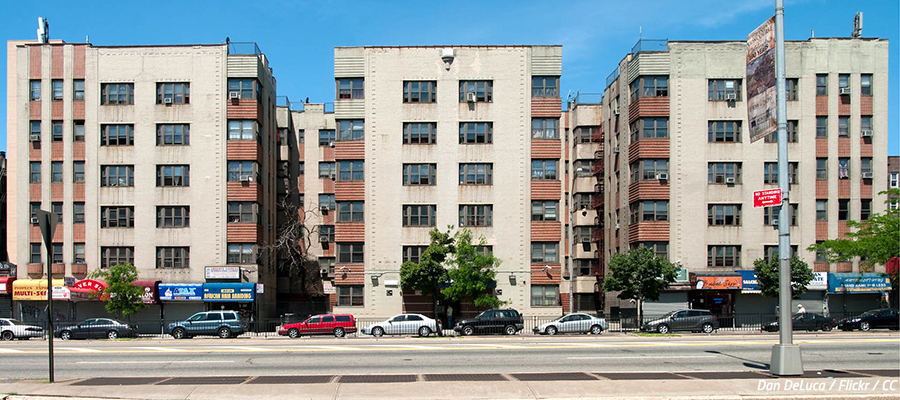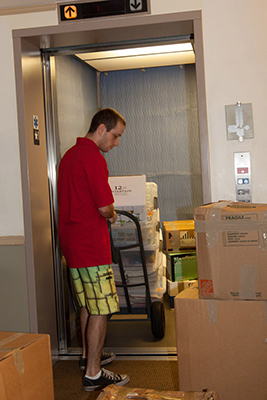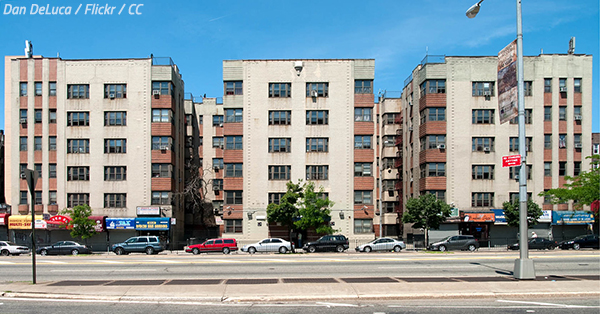 More often than not, moving from a house to an apartment is a major transition that can prove to be more difficult than you anticipate.
More often than not, moving from a house to an apartment is a major transition that can prove to be more difficult than you anticipate.
Without a doubt, the biggest change you’ll notice immediately after the move is the more limited space inside the new place. And this alone may be a bitter pill to swallow for you, especially when you’ve lived in a big house with a spacious garden outside until that moment.
Also, you will need time – sometimes much more time that you are willing to spare – to adapt properly to the new lifestyle changes that apartment living offers. Hopefully, you will be a highly-adaptable person and you won’t be bothered too much during the post-move adaptation period.
Pay attention to these 7 practical tips for moving from a house to an apartment to make the house-apartment transition much smoother and less stressful for you and your family, including any pets you’re taking with you.
1. Downsize and declutter
The most important thing you need to understand when you’re moving to an apartment from a house is that space management in the new place should be treated as a serious business simply because it is just that.
In the majority of cases, the living space AND the storage space in the new apartment will be (much) more limited, so you have to be very careful about how much stuff you bring into the new home.
So, what’s the very first step when moving into an apartment from a house? Reduce drastically the number of belongings you intend to move, of course.
- Inventory all the things you currently own in the house.
- Go through the inventory sheet and mark all the items that are not really worth packing and moving for one reason or another. Be ruthless about it.
- Prepare for packing and moving only the things you do like and you do plan to use in the foreseeable future.
- Make an effort to get rid of all the useless stuff you won’t take with you – sell, donate, give away, or discard the things you have decided to leave behind.
How to Get Rid of Stuff Before Moving
2. Plan your apartment space (floor plan)
Again, the major challenge when moving from a spacious house into an apartment will be the restricted living space in the destination place.
And yes, decluttering your things prior to the move will boost effective space management but you’re also strongly advised to create a detailed floor plan of the new apartment – something that will aid you tremendously in making the right decisions throughout the relocation.
How will a floor plan of the new apartment help you out in your mission to make the house-apartment transition as painless as possible?
A detailed floor plan will help you
- use more effectively the limited space in the apartment because you’ll know in advance the sizes of any furniture pieces and the dimensions of the rooms.
- make up your mind about which furniture pieces to move to the apartment. In some cases, it’s much better to NOT take any large and heavy furniture pieces with you.
- avoid unpleasant situations where bulky furniture items just won’t fit through the small doors or narrow corridors of the destination apartment.
- know way in advance where the bigger items will be placed in the new home through the apartment layout you’ve prepared.
SEVEN (7) Tips for Moving into a Studio Apartment
3. Understand the apartment lease
The importance of reading and understanding the terms and conditions of your apartment lease cannot be stressed enough.
Keep in mind that there are several key points you should look for and understand fully before you sign the apartment lease.
-

Make sure you read and understand the terms and conditions of your apartment lease before signing it.
Lease Term. This is the duration of the lease – usually, it is one year but it can be more or less in your case.
- Rent. How much is the rent? When is it due each month? And what would happen if the payment were late?
- Security Deposit. Most landlords require a security deposit to cover any potential damage to the apartment. Make sure you understand the amount of the security deposit and what might cause you to not get it back when you decide to move out of the apartment.
- Maintenance and Repairs. The lease should specify who is responsible for repairs and maintenance.
- Policies. Find out your landlord’s rules for noise, pets, guests, smoking, and so on. Make sure you are OK with these rules before signing the apartment lease.
- Utilities. You just have to know which utilities you’ll be responsible for – in some cases the utilities are included in the rent.
- Dispute Resolution. The apartment lease must outline the process for resolving any possible disputes between you and the landlord or property manager.
4. Create a moving budget
Proper budgeting for the move will help enable you to avoid spending more money than you absolutely must and to cut packing and moving costs whenever possible.
When you’re following a detailed MOVING CHECKLIST, like you should, you will know that the all-important task of creating a moving budget has to be completed at the very beginning of your pre-move preparations.
But what to budget for when moving from a house to an apartment?
- Moving company fees. Regardless of whether you’re moving locally or across the country, hiring professional movers comes with a price tag. Request moving cost estimates from the best movers in your area to know how much your mover will charge you.
- Extra moving services. Each extra service you request from your moving company – packing, unpacking, furniture disassembly and/or reassembly, temporary storage, and so on – will cost you more money.
- Additional insurance. If you’re moving high-value items, then you must purchase proper moving insurance (Full Value Protection), either through your mover or from a third-party insurance company.
Additionally, you should be well aware of the costs associated with apartment living. Create a separate budget for the immediate post-move expenses you are expected to cover when moving into an apartment:
- monthly rent,
- security deposit,
- utilities,
- renter’s insurance,
- urgent household items for the apartment,
- stocking up on groceries, and so on.
What to Budget for When Moving Out
5. Pack up your things by yourself
When moving from a house to an apartment, one of your top priorities should be to keep your moving expenses to their absolute minimum. Thus said, one excellent way to save money on your local or long-distance move is to pack up your things by yourself to the best of your abilities.
Professional packing is the most expensive add-on service you can request from a moving company so whenever possible, you should try to protect and box up your belongings to cut packing and moving expenses.
Hopefully, you will have inventoried and pared down your things by now, so the only thing left for you is to follow a good PACKING TIMELINE – a detailed to-do checklist that’s been prepared especially for the tough task of packing for a move.
- Start packing up your things as soon as you possibly can – by far, it is the most time-consuming task on your moving checklist.
- Prepare the necessary packing materials in advance so that you don’t lose precious time during the packing process.
- Consider getting free moving boxes to further lower your packing expenses.
- Initiate the packing job from the storage areas in your house – basement, attic, garage, closets, and spare rooms – as those are the premises that are the hardest to sort and pack for a move.
6. Hire professional apartment movers
Moving into an apartment from a house presents a few extra challenges, especially if you happen to be moving into a high-rise apartment in another part of the country.

Trust experienced apartment movers with your house-to-apartment move.
The first obstacle is the STAIRS. Having to carry heavy furniture pieces and boxes up the stairs is a job that’s better left to experienced apartment movers. As an extra challenge, the elevator in the building may not be out of order at that moment or you may be moving into an apartment building with no elevator at all.
The second possible hurdle may be the ELEVATOR. While it does sound convenient to be able to use an operating building when moving into an apartment, the building elevator will first have to be reserved and then properly padded with furniture blankets for extra protection.
Experienced apartment movers will make your move so much easier by taking care of the most stressful tasks for you, including the dreaded task of packing if you don’t have enough time or you just don’t feel confident enough to complete it on your own.
But above all, they will handle the heavy lifting on the day of the move so that you and your family can breathe a sigh of relief that you’ll stay 100% safe from any possible injuries. As a bonus, you won’t need to ask your friends for a big favor either.
Use our Moving Cost Calculator to get in touch with the best apartment movers in your area.
7. Change the address and transfer the utilities
Your personal moving checklist will guide you well while you’re getting ready to move into an apartment from a house. Nevertheless, keep in mind that two of the most important pre-move tasks you will have to tackle prior to the move are to change your address and transfer the house utilities.
Change the address
Technically speaking, you could initiate the change of address (COA) procedure after you move into the apartment. However, it’s better to do it before you move out of the house to ensure that you continue to receive your important pieces of mail without any problematic interruptions.
Luckily, it’s easy to change your address before you move out of the house – you’ve got 4 options to do it as soon as you find some free time in your moving calendar:
- Change your address in person by visiting the nearest post office;
- Change your address online by visiting the official USPS website;
- Change the postal address by phone; and
- Change the address by mail (of course!).
How to Do a Change of Address When Moving
Change the utilities
The second super important task that you should remember to take care of is to change your house utilities. Soon enough, you won’t live in the house anymore, so you wouldn’t want to continue to pay for services you won’t use, would you?
If you’re moving into the new apartment as an owner, then you must change the utilities to your name. On the other hand, if you’re moving into an apartment as a renter, then it’s likely that you won’t have to do anything except work out the details in the apartment lease with your landlord or property manager.
Either way, you will definitely need to disconnect the current house utilities before you move out of the house. Follow the link below to learn the best way to do it.
How to Change Utilities When Moving House
Bonus advice: Focus on the positive aspects of apartment living
For better or worse, you’re moving from a house to an apartment and there’s no going back now. Fortunately, apartment living after a house offers a number of benefits, so it’s time for you to focus on all the positive aspects of apartment living.
The major benefits of apartment living are:
- Less Maintenance. One of the significant advantages of apartment living is the reduced maintenance required. Generally, the property management handles repairs and sometimes even certain utilities.
- Security. Many apartment buildings offer enhanced security features, including gated access, security systems, and surveillance cameras.
- Amenities. Apartment complexes often provide various amenities such as a gym, swimming pool, community centers, playgrounds, and laundry facilities.
- Location. Apartments are often located in more central, urban areas, which means easier access to public transportation, businesses, restaurants, and cultural activities. This convenience can save time and commuting costs.
- Flexibility. With shorter lease terms, apartment living allows for greater flexibility. If you have to move for a job or personal reasons, you can do so with relative ease and without the hassle of selling a house.
- Simplicity. An apartment often has less space than a house, which can simplify living. There’s less to clean, less to maintain, and less to clutter up with unnecessary possessions.
Moving Into an Apartment for the First Time: Checklist and Tips









